The Light from the TV Shows: A Chat with Lorenzo Lamas (“The Joe Schmo Show”)
For someone who’s best known for his work in prime-time soap operas (“Falcon Crest”), syndicated action series (“Renegade”), and straight-to-video shoot-’em-ups (including the “Snake Eater” trilogy, among many, many others), Lorenzo Lamas is a pretty funny fellow, and he gets a chance to show that side of himself – along with several other sides, to say the least – when “The Joe Schmo Show” returns to Spike TV tonight at 10 PM / 9 CST. Lamas took some time to chat with Bullz-Eye before and after the show’s panel at the winter Television Critics Association press tour, and he talked about how much fun he’s having showing off his comedy chops while also taking time to delve into his life and times up to this point.
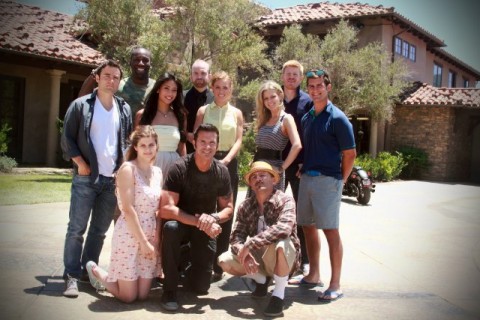
Bullz-Eye: Well, I was able to watch the first two episodes…
Lorenzo Lamas: Oh, yeah…? How did you like it? What did you think about it?
BE: It was great. I liked the first season, but I never actually saw the second season. But this looks like it’s right on par with what the show’s been like before.
LL: From what I gather, the guy they cast for this “Schmo” is a lot different than the first guy. And what I’m gathering is that…the first guy was just a really great, friendly, open, more innocent kind of guy. Like, a real Joe Schmo, y’know? [Laughs.] Whereas I found Chase to be a very analytical, intelligent, not quite as naïve guy.
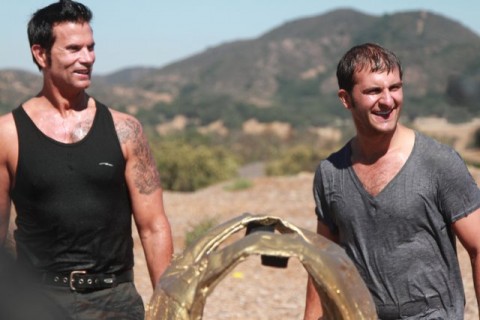
BE: Yeah, he seemed like a sweetheart, but he also seemed like a guy who really wanted to win, too.
LL: Yeah, really competitive. Absolutely.
BE: So how did you find your way into this? Did they approach you, or was there a casting call and you heard about it?
LL: You know, John Stevens and I had done something last year together – a pilot for an action show, a hybrid that was part reality, part scripted – so we met on that project, and then when Sharon Levy talked to John about doing this version of “Joe Schmo,” John says, “Well, what do you think of Lorenzo Lamas?” So he kind of brought it up to Sharon, and then Sharon asked, “Does Lorenzo do comedy?” Because the whole idea is this 10-day-long improv where everyone’s in character and they have to really stay in character. So John called me and said, “I’ve got something that’s kind of out of left field, but…would you be interested in doing this show?” And then he kind of formulated a pitch to me. And I had just finished doing “The Eric Andre Show,” and I loved it. That was improv, too. I did one episode, then they brought me back and did another episode. I’d just finished doing it, so I said, “You know, John, I think this might be meant to be…” Because prior to that, I’d also done a couple of episodes of the Nickelodeon show “Big Time Rush.” I played Doc Hollywood, who’s a bigger-than-life character, almost slapstick comedy. And I’ve been enjoying that. I’ve been enjoying the change, wrapping my mind around just…not doing action, y’know?
BE: Did they give you advance warning as to how much, uh, disrobing would be required of you on “The Joe Schmo Show”?
LL: You mean how revealing the part would be? [Laughs.] Yeah, that was John Moore. When I told John Stevens that I’d love to be a part of the show, then I went in to talk to J-Mo – John Holland Moore – about the nuts and bolts of how we were going to do this, and one of the first questions that John asked me was, “How comfortable are you wearing a Speedo on television?” I was, like, “Well, I’ve gotta know you better, J-Mo…” So I figured it’s either gonna be a show that’ll resonate with the public, or it’s gonna be a show that’ll basically shun me from the public.
BE: Either way, you can probably count on headlines along the lines of, “Another side of Lorenzo Lamas.”
LL: You know, you kind of have to just go for it. Listen, they say that being an actor, a real actor, is being fearless. And you kind of have to go to the wall with your character, beyond what you may feel are your own personal limitations. I don’t thrive on public exposure. It’s not in my nature to do that. But for this character…it was perfect for this hyper-diva character I was playing.
BE: Okay, I’ve got some flashbacks for you, if you’re up for it.
LL: Sure!
BE: First of all, I’m curious if IMDb is accurate on your supposed first onscreen appearance: did you indeed play an Indian boy in the movie “100 Rifles”?
LL: [Laughs.] I was an extra on one day of shooting in that movie, yes. My dad put me in that. I showed up on location one day to hang out with him in his trailer, and I was driving him crazy. I mean, I was 10 years old, just following him around the set. All of a sudden, he says [In a perfect Fernandos Lamas impression.] “Lorenzo, we have to find something for you to do.” And he took my hand, and he dragged me to the wardrobe trailer, and he asked the wardrobe assistant, he says, “Can you give my kid a wig and some clothes? He’s going to be an Indian boy for the rest of the day.” [Laughs.] So that was my debut, if you will.
BE: Did you always know that you wanted to follow in his footsteps, or did it just kind of happen?
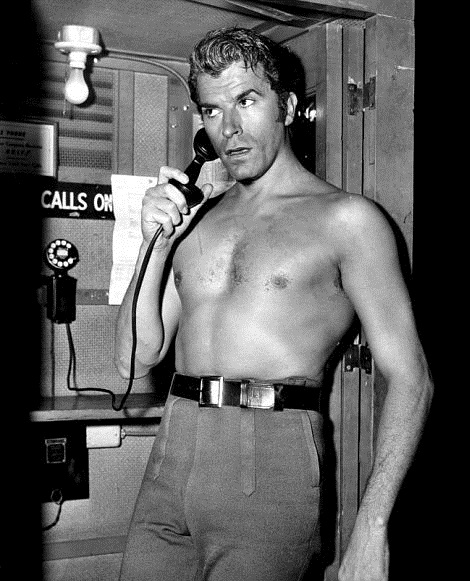
LL: No, I actually didn’t. I didn’t even entertain the thought of being in acting until after high school, after I’d gone to a year of college and things just weren’t clicking academically for me. It was a scary moment. I’m sitting in my van in a parking lot at Santa Monica City College, thinking, “This police-science course is really difficult. What the hell am I gonna do with myself?” And it just struck me at that point, thinking that maybe there was a way for me to learn how to act and to follow in my dad’s footsteps. Also, y’know, in high school, I…I wasn’t thin. I wasn’t athletic-looking. I was overweight. I had a pretty heavy insecurity complex. So I never thought of myself as being able to live up to my father and fill his shoes. There was no fricking way I would ever assume that I could do that. So I kind of put that aside. But by the time I got to college, I’d shot up a little bit, put on some muscle, and I had a little bit more confidence in myself. I was swimming for the college team, and I said, “Well, if you’re gonna try something, idiot, you might as well try it now before it’s too fricking late, and you’re gonna be pumping gas and parking cars for the rest of your life.”
So I did. I drove to my dad’s house, and I said, “I think I wanna leave college and be an actor.” And there was a long pause…and he said, “No fucking way, asshole.” [Laughs.] He said, “You’re going to be an attorney or a business major or…” I said, “I’m not feeling that, Dad.” And he looked at me again, and he said, “Okay, then. Well, before you make a fool out of me, you’re going to do a scene with Esther (Williams),” my stepmother. And I did an improv scene with her that day, and he picked up the phone and called Tony Barr, who was an executive at CBS at that time, and…Tony was running a school in Burbank called the Film Actors Workshop. And I started going there at night, working during the day as a trainer at Jack LaLanne’s, which was a health spa back in the day. And I did their course, and after their course, my teacher, Laura Rose, said, “Go out there and start auditioning.” And that was 1976. And the first real television that I got was for a sitcom pilot, ironically, for James Komack, who wrote “Chico and the Man” and “Welcome Back, Kotter.” I auditioned for this part, and I got it, and it was “Whatever Happened to Dobie Gillis?” I was a character that they added in. My name was Lucky, and I was a box boy at a grocery store. And that was it. So here we are now, 30 years later, and I’m back doing comedy. [Laughs.] It’s just weird, y’know?
BE: One of your first major TV gigs, “California Fever,” actually puts you within two degrees of “Downton Abbey”: Elizabeth McGovern was a guest star in one of the episodes.
LL: Absolutely! I think her character actually had a storyline with Jimmy McNichol rather than mine. But then after that show, which was in 1979, I didn’t really see much of her. She started to do a couple of movies, and then I didn’t see much of her. But she was always a really good actress, I certainly remember that.
BE: You were in “Grease,” which is not a bad film to have on your resume.
LL: Are you kidding? It’s like having “The Sound of Music” on there. [Laughs.] It’s an incredible thing for something like that to happen. Now, I was a very small part of that movie. I basically was a glorified extra, if you will. I mean, I didn’t even have a line in that picture! But to think of how exciting it must’ve been for Jeff Conaway or Dinah Manoff or Didi Conn, these – at the time – kids, some of whom who’d performed on stage in “Grease,” playing other characters in some cases, and then for it to become a Paramount picture in national release with John Travolta…wow, it must’ve just been so exciting for them. I mean, it was exciting to me, but I’d only been acting for eight or nine months.
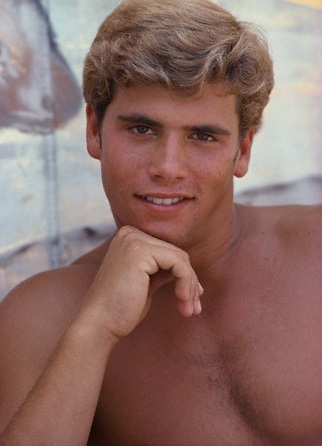
I just happened to get in on the end of casting for the T-Birds. They had cast all the parts, and I walked into Allan Carr’s office, with Allan and Randal Kleiser, and they just started asking me what I was into. I told them, “Well, I’m a physical trainer, and I pump gas.” [Laughs.] “But I really want to be an actor!” And they said, “Oh, okay, well, we don’t have anything for you at this time, but we’re really happy to have met you, and we wish you all the best, and we know that, with your parents, you’re bound to do good things.” I mean, it was just a very polite…
BE: Kiss-off?
LL: [Laughs.] Yeah, basically. A very polite way to say, “You’re not going to be in our movie.” And it wasn’t long after that…I think they had gone into rehearsals about two weeks prior to me getting another phone call, my agent saying, “You’re going in to replace Steven Ford as the hunky football player.” And I said, “Really?” So that was that. I had no experience, either in dancing or even acting, pretty much, except for going to that school. So to have a part in a movie that was that iconic was pretty amazing.
BE: Within a few years of that, though, you were on “Falcon Crest.”
LL: Well, a little bit after that. We filmed “Grease” in 1977, it was released in ’78, and then “California Fever” was ’79. From there, I did a couple of small-budget movies. One was for Rudy Durand with Brooke Shields called “Tilt.” And I did a movie for Kieth Merrill, who won a Best Documentary Oscar for “Greatest American Cowboy,” called “Take Down.” It was a movie about high school wrestling for Buena Vista, which was basically Disney. It was my first real leading role, and it was kind of a “Rocky”-esque story about a kid in high school who has an alcoholic father, and he faces all the odds, he’s failing at school, and he becomes the star wrestler on the high school team and graduates. You know, actually, it’s less “Rocky” and more like “All the Right Moves.” Basically, I was just kind of bouncing around, getting a part here, a part there, a break here, a break there. But nothing really happened until 1982, when I got “Falcon Crest.” I did a couple of pilots for Lorimar and…oh, actually, one series did go. It was called “Secrets of Midland Heights,” with Robert Hogan, Bibi Besch, and Linda Hamilton. That was Lorimar, and it went nine episodes. But after that, nothing until “Falcon Crest.”
BE: Was it a long audition process to get “Falcon Crest”?
LL: Fairly long, yeah. They had a lot of characters to cast and a lot of actors who wanted to be in it. [Laughs.] I think I read two times for the writers, and then one more time for the producer and the director, and then they liked the audition, so I went to test for the network executives, which was another audition.
BE: So given your parentage, was Jane Wyman a family friend?
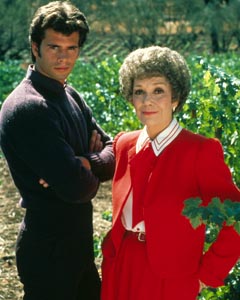
LL: Jane Wyman was a family friend. I’d never met her, but she knew my father because he did her show, “The Jane Wyman Show.” It was a 90-minute variety show. My mom was pregnant with me at the time, and after the first act, the stage phone rang, and it was the hospital where my mother had to be taken because of an emergency. I was being born, and it wasn’t a normal birth situation. My mother was having difficulties with me. And they called Dad, and Dad left Jane…on live television! During the commercial break, he took off! So when I first met Jane, she kind of laughed about it and made a joke, like, “I hope you don’t leave me without a second act like your father did.” [Laughs.]
But we became very, very close. She was like my grandmother. She really was. She played my grandmother on TV, and I really respected her and listened to her a lot like you would a real grandmother. That show was like my graduate school. There were some wonderful actors on that show – Robert Foxworth and David Selby and Susan Sullivan – and then we had a great guest cast. Cesar Romero came in, Cliff Robertson…and, gosh, I mean, Robert Taylor! All these great iconic actors…and here I was, this twentysomething young idiot, just hoping not to bump into furniture, make my mark, and not look like a fool. I learned so much on that show.
BE: When the show had run its course, did you have a desire to leave television and move into film, or did you immediately go looking for another series?
LL: No, y’know, I was on that show for nine seasons, and it was a scripted drama, and…I grew up watching Bruce Lee and Chuck Norris and Sean Connery and all these great action characters, and after nine seasons of being on a soap opera, I really wanted to try to do action. And I told my agent that I really wanted to go and try to break into the action genre, which was starting to really take off, and he said, “Well, let’s see what we can get going here.” He reached out to a Canadian company called Cinepix, who were doing low-budget action movies in Montreal, and they sent my agent a script called “Snake Eater.” And the first thing I said was, “They’ve got to change the title. Because no one’s gonna know what ‘Snake Eater’ is, and even if they do, it’s not gonna be attractive.” [Laughs.] But I wanted to do the part, because it was a really good role. He was a loner, the kind of part I wanted to play. A hero, a stand-up guy, a cop that was an ex-Marine, so he had a back story. So I agreed to sign on to do that, and I did three of those, pretty much back to back. And during the late ’80s and early ’90s, that really broke open my acting opportunities. Because, y’know, the industry knew I could act because I’d done drama for so long, but they didn’t really know I could do action.
So that kind of helped to open that door, and then Stephen Cannell asked me to play Reno in “Renegade,” and that’s when I was really able to bring it full circle and use my acting chops along with my karate chops, if you will. [Laughs.] And that was a very successful genre for me. I did five seasons of “Renegade,” and in between seasons of “Renegade,” I would do action movies that would go to video. But that marketplace was just booming back then. I mean, direct-to-video was a huge market, and I had a very strong foreign name because of “Renegade” and because of “Falcon Crest,” so it was very easy to get financing just based on the fact that I was doing the picture. So I did a lot of those.>
But then around 2001, I finished my last action show for television, one called “The Immortal,” and there was nowhere left for me to go, because one-hour syndicated television was drying up and the foreign companies that financed the straight-to-video movies were not buying any American talent or doing American scripts anymore. They were producing their own shows and their own movies in their country. So I was really just kind of stuck, not knowing where I was going to get the next paycheck. So I raised my kids. [Shrugs.] I raised my daughters, who are pretty much teenagers now, and…I was glad to have had the time to really be a dad, to really do that the right way. And to do a little stage, a little theater. And that pretty much kept me busy until a couple of years ago, when I started to do a little comedy. I did “Big Time Rush” for Nickelodeon, I did an animated show called “Phineas and Ferb,” where I played the character Meap, and a little more comedy here and there, including episodes of “Reno 911!” and “NTSF: SD: SUV.” And then John Stevens called me and said, “Would you like to come on board and really push the limits of your comedic abilities?” [Laughs.]
>I really, really enjoy the process of comedy. I’m even taking a stand-up comedy class and getting some experience onstage doing stand-up. I had a cabaret show I was doing up until about a year or so ago, and I think that gave me the confidence. Also, doing the soap opera “The Bold and the Beautiful,” which is shot pretty much live. I mean, it’s obviously tape-delay, but they shoot it like a live television show. There’s very little rehearsal, and you don’t get another take, so you have to come on camera ready to go. And I think that experience really helped solidify my confidence and my acting. So now I can walk around in a blue Speedo and be okay with it. [Laughs.]
BE: Okay, just a few more things to wrap up. First of all, I can’t not ask you about “Body Rock.”
LL: I wanted to do that movie so bad…and my manager did not want me to do that movie. [Laughs.] And I fought and I fought, and he finally said, “Okay, dammit, if you want to do it that bad, then go ahead and do the movie. At least I got a friend of ours in it: Ray Sharkey.” I said, “Oh, cool!” Because my manager at the time was handling me and Ray and Ken Wahl. To this day, I look at that movie and I go, “Why didn’t it work?” You know, it was the perfect time for that movie, it had a great soundtrack… I think what it was was that it was at the tail end of a string of movies like “Beat Street” that were basically…the hip-hop culture at that time was really still almost underground, and we had a very strong urban audience. The movie opened for New World to respectable numbers, but we didn’t have that second weekend, y’know? I think the numbers weren’t that big for what the studio was expecting. But I liked the movie.
BE: You got a small hit single out of it, too.
LL: Yeah!
BE: Which is no doubt on YouTube, although I should’ve checked that before we chatted.
LL: I don’t think so. I don’t think it is! [Laughs. ]
BE: Well, if it is, you can count on it being posted with the interview.
LL: I was pissed that it didn’t make the studio soundtrack, actually. Because I was under contract to Scotti Brothers Records, so I couldn’t do the studio album. My single couldn’t be included on the studio album. Which is too bad, because that studio album for “Body Rock” did really well. But, hey, listen, you chalk it up to experience, and you walk away from stuff that you do without understanding why it didn’t perform well, but you look back on it, and…well, it’s like a movie, actually. There’s a storyline, and one thing leads into something else because you’ve met this people on this thing. Which is why I’m here doing comedy and feeling very comfortable about it.
BE: You’re in the promo for Michelle Beadle’s new series, “The Crossover.” How did that come about?
LL: They just wanted the craziest bunch of reality-show dropouts that they could think of. [Laughs.] So it’s me, Gary Busey, Jose Canseco, Kara Todd, Dennis Rodman… And when I got that, I asked, “Well, who else is doing the commercial?” And they said, “We can’t tell you.” So I didn’t know who I was going to be doing the commercial with until I got to the set that day. Oh, it was crazy, man. Because I knew Jose from before, so we were friends. Gary Busey and I have worked on probably a dozen movies together that went straight to video, so I knew Gary. Anyway, we just had fun.
BE: Lastly, is there any project you’ve worked on over the years that didn’t get the love you thought it deserved?
LL: I’ve got to say “Body Rock.” And probably “Take Down,” the wrestling picture I did. I think the problem with “Take Down” was that Buena Vista didn’t really know how to market a PG-rated picture. It was the first PG-rated film that Disney ever distributed under their banner. Of course, then they later formed Touchstone. It would’ve been great if it’d been under Touchstone. But I think its timing was off, and that was a disappointment, because I was really hoping that that movie was gonna kick off a motion picture career for me. It got a major theatrical release, it was a decent movie with a great story and a great cast, including Edward Herrmann and Kathleen Lloyd. But, y’know, you never know. You never do know. And that’s what makes this show, “The Joe Schmo Show,” both exciting and scary for me. Because people who know me don’t know me as a comedy actor. So I’m hoping that they dig it. But I just don’t know. I guess I’ll find out on Wednesday morning, right? [Laughs.]
Related Posts
Comments Off on The Light from the TV Shows: A Chat with Lorenzo Lamas (“The Joe Schmo Show”)
Posted in: Entertainment, Interviews, News, Television
Tags: Bibi Besch, Big Time Rush, Body Rock, Brooke Shields, California Fever, Cesar Romero, Cliff Robertson, Crossroads, David Selby, Dennis Rodman, Didi Conn, Dinah Manoff, Downton Abbey, Edward Herrmann, Elizabeth McGovern, Esther Williams, Falcon Crest, Fernando Lamas, Film Actors Workshop, Gary Busey, Grease, James Komack, Jane Wyman, Jeff Conaway, Jimmy McNichol, John Holland Moore, John Stevens, John Travolta, Jose Canseco, Kara Todd, Kathleen Robertson, Kieth Merrill, Linda Hamilton, Lorenzo Lamas, Michelle Beadle, Phineas and Ferb, Randal Kleiser, Ray Sharkey, Renegade, Reno 911, Robert Foxworth, Robert Hogan, Robert Taylor, Rudy Durand, Secrets of Midland Heights, Sharon Levy, Snake Eater, spike tv, Stephen J. Cannell, Susan Sullivan, Take Down, The Bold and the Beautiful, The Eric Andre Show, The Immortal, The Jane Wyman Show, The Joe Schmo Show, The Light from the TV Shows, Tilt, Tony Barr, Whatever Happened to Dobie Gillis?, Will Harris








